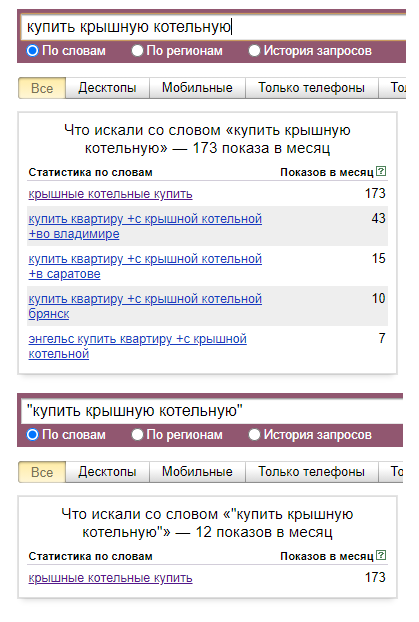Answer the question
In order to leave comments, you need to log in
WordStat search queries with and without quotes, how to use them correctly in the context of SEO?
Yandex Wordstat is a service that provides statistics of search queries entered into the Yandex search engine.
https://vc.ru/seo/61277-operatory-yandeks-vordstat
Why are quotes needed in a search query?
When showing a client who ordered website promotion the possible number of clients, unscrupulous SEO specialists deliberately do not put keywords in quotation marks. So the numbers are more impressive. But in addition to banal deception, they make a serious mistake - they lose sight of important requests.
If you write a keyword without operators in Wordstat, the service will display the total number of impressions of this query with the addition of additional words. And the final figure is several times higher.
And if you write keywords in quotation marks, there will be real data. In this case, numbers are shown for a specific query and its word forms (without adding additional words).
https://cityhost.ua/blog/kavychki-v-zaprose-polezn...
The query in quotes is an exact match. In this case: buy a rooftop boiler room and buy rooftop boiler rooms - this is one request for Yandex and they ask for it 173, not 12 - enter both requests in Yandex and you will be convinced. You start from the logic of the direct, but in seo it doesn’t work that way.

Answer the question
In order to leave comments, you need to log in
"Buy a rooftop boiler house" and "buy rooftop boiler houses" is one request for Yandex, and it understands both options as one, despite the fact that both are in quotation marks, so they request one and the other combined about 12, not 173 times in month?
the request for which he promoted the site is much more high-frequency (not 12, but 173), i.e. erroneous or intentionally misleading. Or am I wrong?
In general, you can use it for all sorts of tricks to get deep queries, for example, specifying the city three times
Didn't find what you were looking for?
Ask your questionAsk a Question
731 491 924 answers to any question